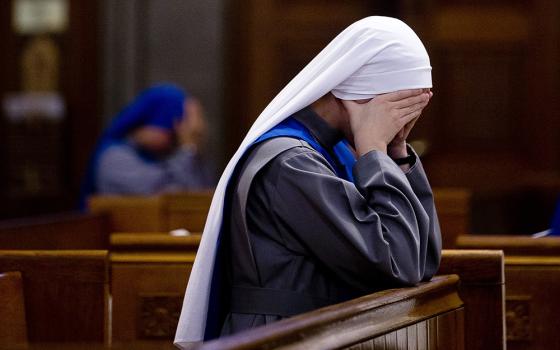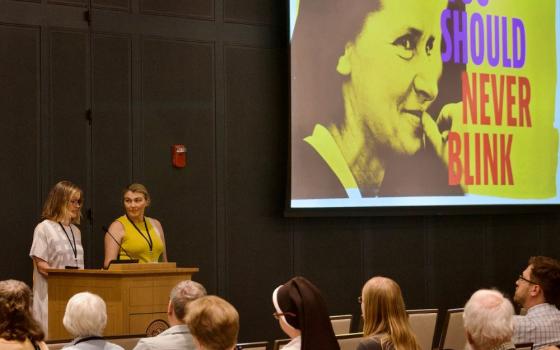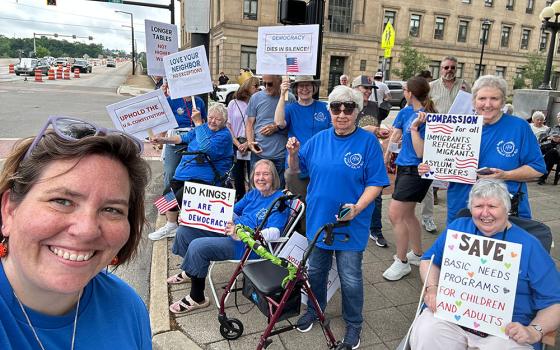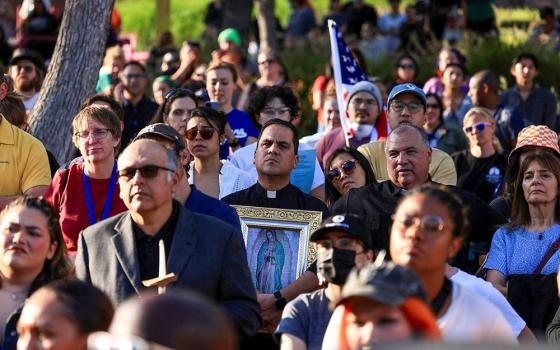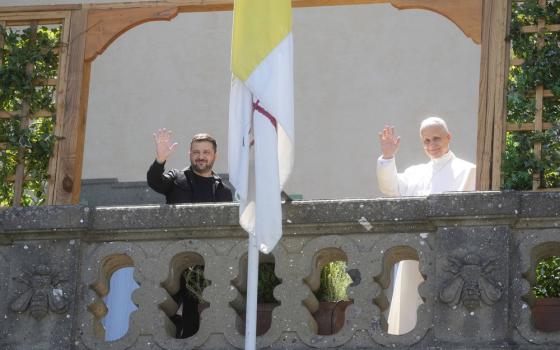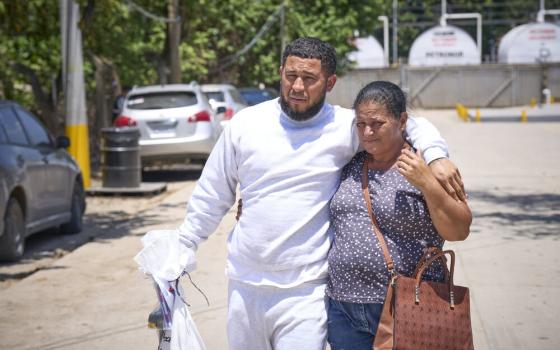
Migrants camp outside the Casa de los Pobres in Tijuana, Mexico. (Courtesy of Clara Malo)
Editor's note: Global Sisters Report's new series,"Welcoming the Stranger," takes a closer look at women religious working with immigrants and migrants. While we cover this topic often, this series will feature sisters and organizations networking to better serve those crossing borders, global migration trends and the topic of the issue of immigration in the upcoming U.S. presidential election.

I, Tobit, have walked in the ways of truth and righteousness all the days of my life and have distributed much alms among my brethren and countrymen, deported with me to Nineveh, to the land of the Assyrians [Tobit 1:3].
Thus begins the book of Tobit, which was present in my thoughts throughout the week of pilgrimage I experienced on the border between Mexico and the United States. Alongside a group of religious men and women from various congregations, I visited shelters and migrant homes in San Diego and Calexico in California, and Tijuana and Mexicali in Mexico. I witnessed and listened to stories that echoed one written more than 2,000 years ago.
When I returned to Mexico, I took my Bible to read the book slowly. It is a never-ending story of misfortunes: "The roads of Media became unsafe and I could not return there" (Tobit 1:15). "When I learned that the king had reports about me, and that he was looking for me to kill me, I was afraid and fled. All my goods were taken from me" (Tobit 1:19-20).
All the migrants I spoke to were fleeing. Again and again, the same story was repeated: organized crime groups extorting small merchants, threatening them with death if they did not pay the "piso," that is, the fee to continue working. When the fees become unpayable, what follows is the loss of all property, or life.
Alongside a group of religious from various congregations, I visited migrant shelters on the U.S.-Mexico border. I witnessed stories that echoed one written more than 2,000 years ago.
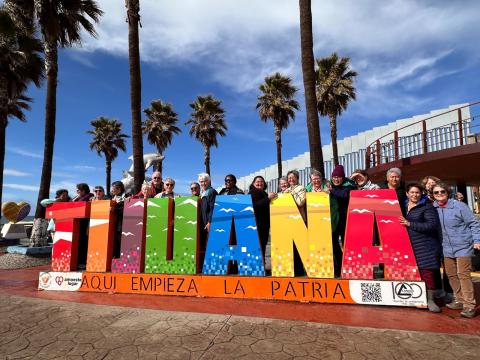
More than 20 Catholic women religious from five different congregations, as well as a Franciscan friar and a priest from the Seattle Archdiocese, participated in the Feb. 5-9 border pilgrimage. (Courtesy of Clara Malo)
I spoke with a young married couple, with two young children, who had to flee town because the alternative to paying the fee was for the father to start working as a hitman for one of these groups. "How am I going to become a killer! I can't do that to my family," he exclaimed.
Another family, from a small town in the highlands, had to flee when an armed group came to take them from their home. "If you are still here tomorrow at dawn, we will kill you all, starting with the children," they warned. The threat was not empty: A few years ago they had already kidnapped and murdered two members of the family.
In the Book of Tobit, Tobit continues to enumerate his misfortunes: "Hot excrement fell into my eyes and white spots appeared. I went to the physicians, that they might cure me; but the more remedies they applied to me, the less I could see because of the spots, until I became completely blind" (Tobit 2:10).
Poverty and sickness also led to misunderstandings and quarrels between the couple. Finally, Tobit turns to God, placing the reality of his people before him: "We have sinned in your presence, we have not listened to your commands and you have given us over to plunder, exile and death. ... We are the mockery of all the nations among whom you have scattered us" (Tobit 3:3-4).
Seeing the number of migrants waiting at the border, in a sort of limbo, I can't help but think of the "sins" of origin that have led to this situation. That multitude displaced from their lands, whose only hope is to cross the border, would not be there if not for the criminal groups that have become all-powerful. Clearly, it is not God who has caused any of this, but Tobit's prayer expresses the harsh realities they have had to face: plunder, exile and death.
Migration always involves two stories: those who leave and those who stay behind. Those who stay behind experience a blend of anguish and hope. One of the most painful moments of the pilgrimage was the visit to the cemetery in Holtville, California. At first, one encounters a typical cemetery: well-kept graves, trees, flowers ... but in the background there is a wall with a sign: "No trespassing."
Behind the wall, what can be seen is an enormous arid terrain, where the nameless graves are marked only with stones. They are anonymous migrants, who after completing the entire journey to cross the border, are buried there without their families knowing about them.
I could not help but think of the irony: They managed to enter the United States, but even after death, they are kept isolated behind a wall. How many mothers are wondering about them? Do they believe that those who left with the promise of returning are still alive?
Migration always involves two stories: those who leave and those who stay behind. Those who stay behind experience a blend of anguish and hope.
When the deadline passed without the son having returned, Tobit thought, "Will there be anything to keep him there?" And he began to be sad.
Hannah, his wife, said, "My son is dead and is no longer counted among the living." And she began to weep and mourn for her son, saying: "Woe is me, my son, that I let you go, O light of my eyes!"
Tobit said to her, "Hush, sister, don't think that. He is well. They may have had some mishap there, but his companion is a trustworthy man and one of us; do not worry about him, for he must be near."
She replied, "Leave me, don't try to deceive me. My son is dead." And every day she went to look at the road where her son had gone. She believed no one. And when the sun went down, she went into the house and spent the nights groaning and weeping, unable to sleep [Tobit 10:1-7].
Advertisement
In the book of Tobit, God is something like an "invisible character." He is not present on every page, but he is the hand that guides events. The story has a happy ending thanks to Raphael, an angel who acts incognito: Without explicitly saying that he comes from God, he accompanies, gives instructions, coordinates meetings, shows the means to seek refuge, health and to return home. Ultimately, what he does is rebuild trust and hope in Tobias and his family.
After those days at the border, I can only thank God for so many angels who continue to do that work:
- The Franciscan Missionaries of Our Lady of Peace at the Casa de los Pobres (Tijuana, Mexico), who offer shelter, food, medical care;
- The Scalabrinian Sisters, who in that same city care for women and children, with a project focused on psychological and emotional care to face the traumas they have experienced;
- Our Lady of Guadalupe Parish in San Diego, which opened its doors to Venezuelan immigrants who are awaiting an audience;
- The group from Border Compassion, which has taken under its protection a shelter in Mexicali, Mexico;
- The Methodist pastor who has taken on the task of helping migrants who were able to cross the border reach their final destination;
- The neighbors who organized themselves to receive the waves of migrants who at some point began to pass in front of them;
- The lawyer who crosses the Mexican border to explain to migrants the legal resources they can count on.
I know that many stories will not have a happy ending like that of Tobit and his family, but God's presence through his messengers remains the same. It is not God who closes the doors, but us. And we are the ones who choose on whose side we stand, not solely out of personal ethics, but as collaborators in God's dream: that all his children find a home.
This column was originally published in Spanish on May 8, 2024.

